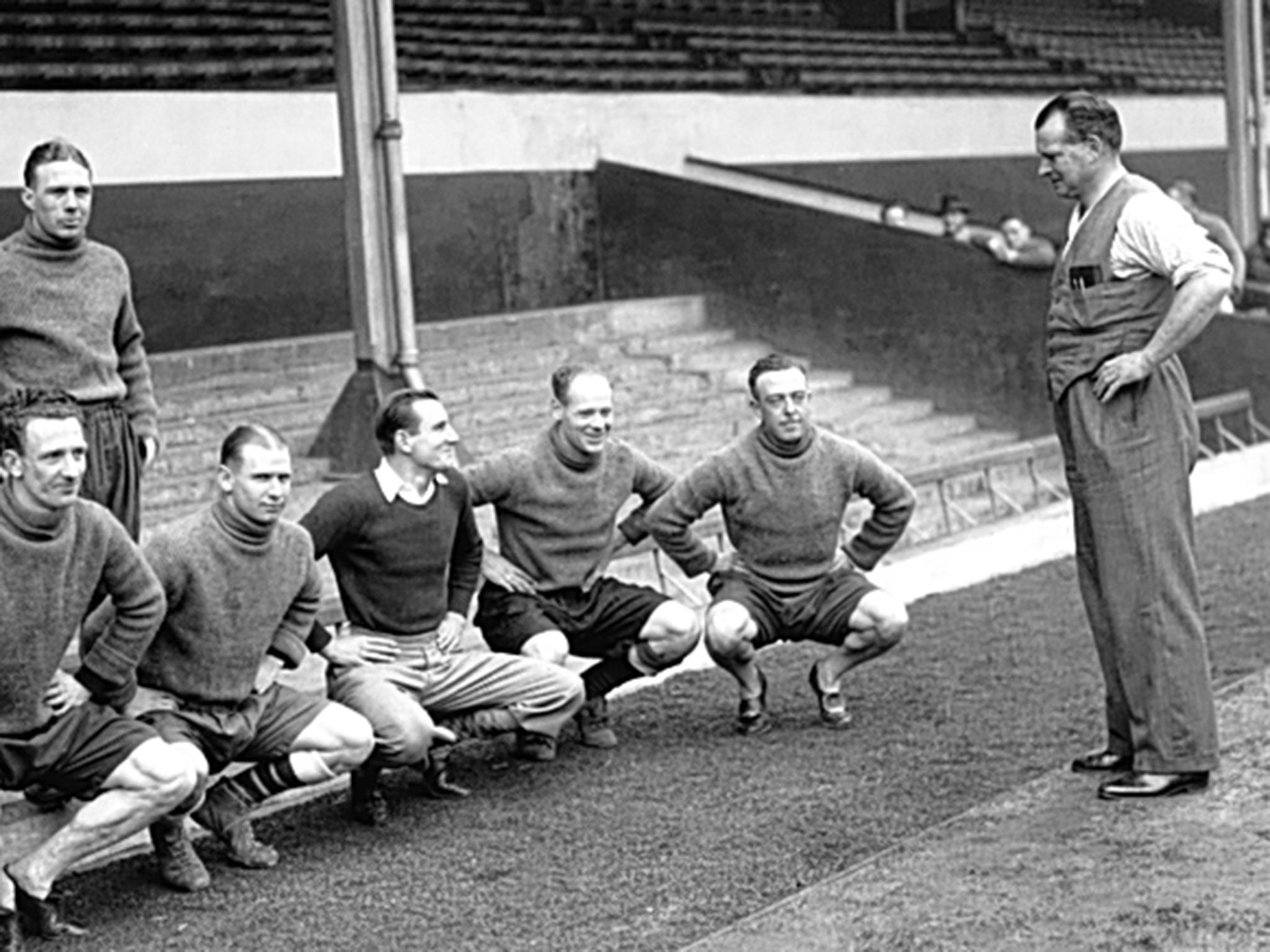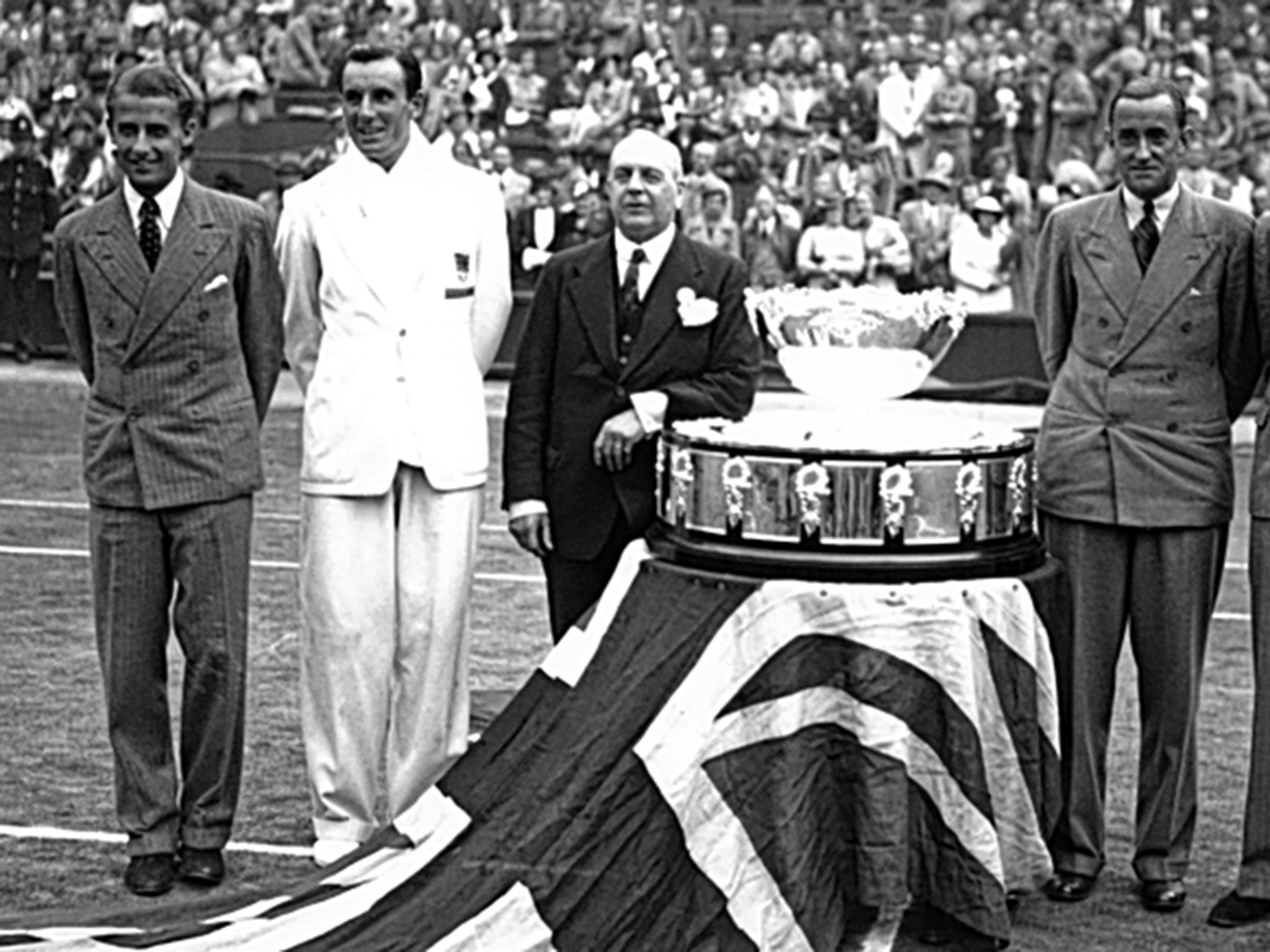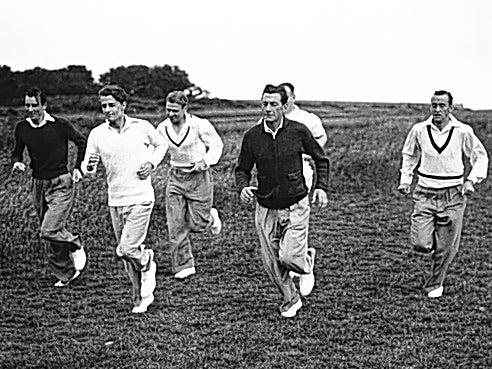Fred Perry: The hero from the wrong side of the tramlines
Fred Perry led Great Britain to its last Davis Cup triumph in 1936 but his face did not fit among the tennis elite. Paul Newman tells a remarkable tale.

Your support helps us to tell the story
From reproductive rights to climate change to Big Tech, The Independent is on the ground when the story is developing. Whether it's investigating the financials of Elon Musk's pro-Trump PAC or producing our latest documentary, 'The A Word', which shines a light on the American women fighting for reproductive rights, we know how important it is to parse out the facts from the messaging.
At such a critical moment in US history, we need reporters on the ground. Your donation allows us to keep sending journalists to speak to both sides of the story.
The Independent is trusted by Americans across the entire political spectrum. And unlike many other quality news outlets, we choose not to lock Americans out of our reporting and analysis with paywalls. We believe quality journalism should be available to everyone, paid for by those who can afford it.
Your support makes all the difference.For the sake of Andy Murray and his colleagues, let us hope that the men who will attempt this week to win the Davis Cup for Great Britain for the first time in 79 years this week do not suffer the same treatment that befell the last of their fellow countrymen to lift the famous trophy.
In 1936, Fred Perry and Henry “Bunny” Austin were feted as national heroes after winning the Davis Cup for the fourth year in succession. However, even before that decade was out, the two greatest British players of their era found themselves cold-shouldered by the country’s tennis establishment. Both went to live in the United States and became American citizens, and both were welcomed back into the tennis fold only in their later years.
To the modern mind, the reasons for their rejection might seem all but unbelievable. Perry, a northerner who was the son of a Labour MP, had the temerity to want to make a living out of his talent and was snubbed for turning professional.
Austin, born into an affluent family who lived in a large house in south London staffed by servants, was from a background much more acceptable to the elite, but found himself shunned for his beliefs. Austin espoused the cause of Moral Re-Armament, a Christian anti-war movement. He was labelled, wrongly, a conscientious objector, for which he paid a price for decades.
Andy and Jamie Murray, along with whoever captain Leon Smith picks to line up alongside them against Belgium in Ghent this week, will be competing for the same huge trophy won by Perry and Austin, but the world the brothers inhabit is very different to that of the 1930s.

Wimbledon was at the centre of the society scene in those days and the higher levels of tennis were dominated by the upper classes. While Austin felt comfortable in that environment, Perry, a man of modest means from Stockport whose father was secretary of the Co-operative Party and Labour MP for Kettering, was regarded by many as an intruder.
Penny Perry, Fred’s daughter, who now lives in Florida, said last week: “There was this great tennis divide. It was like being in two completely different continents – north of Watford and south of Watford. It was just society as it was in those days. You’re north of Watford and you don’t exist – you’re a lesser person. Fred went belligerent with it. His defence was to go on the offence.”
Perry’s uncompromising approach to tennis did not go down well with the traditionalists. He became supremely fit by training with Arsenal and was a ferocious competitor. Not even his brilliance on the court, which saw him win Wimbledon three times and become the first man to claim all four Grand Slam titles, could win over significant figures within Britain’s tennis hierarchy.
One of the defining moments of Perry’s life came on the day he won Wimbledon for the first time in 1934, ending a 25-year wait for a male British champion. After the match Perry was in a bathtub when he heard Brame Hillyard, a member of the All England Club committee, talking to Jack Crawford, the runner-up. “Congratulations,” Hillyard told the Australian. “This was one day when the best man didn’t win.”
Hillyard had brought a Wimbledon tie, which was official recognition of the fact that Perry was now a member of one of the sporting world’s most elite clubs. Instead of presenting it to Perry, Hillyard simply draped it over his seat and left.
Perry later wrote in his autobiography that it was the most angry he had ever felt in his life: “Some elements in the All England Club and the Lawn Tennis Association looked down on me as a hot-headed, outspoken tearaway rebel, not quite the class of chap they really wanted to see winning Wimbledon, even if he was English.”
Austin, meanwhile, went to Repton School and Cambridge University and moved effortlessly in high-society circles. He played tennis with Charlie Chaplin and the Queen of Thailand, was a friend of Daphne du Maurier and the King of Romania, and married the actress Phyllis Konstam.
Austin reached the Wimbledon final in 1932 and 1938. He was the last British man to do so until Andy Murray in 2012. He was also the first man to wear shorts at Wimbledon.
Perry and Austin were never close friends, but they were united in a common cause in the most successful Davis Cup team in British history. It was an era when the tournament was regarded as hugely important.
After Perry and Austin secured the wins that ended the reign of France’s “Four Musketeers” as Davis Cup champions at Roland Garros in 1933, crowds lined every platform when the British team returned to London on the train from Dover.
“Fred was always fiercely patriotic,” his daughter said. “It was absolutely life and death for him. He went out there in the Davis Cup feeling that the country depended on him. He felt that at that moment you belonged to your country.
“In his later years he would get upset when he saw Davis Cup players not wearing their team uniform. If you were representing your country, he said you had to look the part. He would get mad when players chose not to play for their country. He would say that you should play even if you had a broken leg.”
In those days the Davis Cup champions had a free passage into the next year’s final, or “challenge round”. Britain retained the trophy in 1934 and 1935 by beating the United States at Wimbledon, Perry and Austin winning all their singles rubbers.
The 1936 final against Australia was to prove the last of Britain’s nine Davis Cup triumphs. For Perry it was a return to Centre Court three weeks after claiming his third successive Wimbledon title.

Austin and Perry swept aside Crawford and Adrian Quist in the opening day’s singles, but the Australians beat Pat Hughes and Raymond Tuckey in the doubles and on the final day Quist levelled the tie by beating Austin in four long sets.
As Perry prepared for the deciding rubber against Crawford (pictured left with Perry as they head on to Centre Court) – the man who some establishment figures hoped the Briton would lose to in that Wimbledon final – Lawn Tennis Association officials fussed around the British No 1, offering advice on how to handle things if darkness fell. Perry snapped: “What time is it now? A quarter to six? Right, we’ll be off court and finished by 7.15.”
Perry was true to his word, winning 6-2 6-3 6-3. After leaving the court, to the roars of a jubilant crowd, Perry handed his rackets to Dan Maskell, the team’s coach, and turned back. As Perry cast his eye over the scene of his greatest triumphs, Maskell might have been the only other person who appreciated the significance of the moment. “I knew then that he was saying goodbye,” Maskell later told the journalist Richard Evans.
Before the year was out Perry had turned professional. He needed to make a living and the LTA’s vague promises of support never materialised. Barred from all Grand Slam and other amateur tournaments, he played professionally in the United States. He quickly felt at ease with the American way of life and took US citizenship.
Subsequently, Perry was never in Britain for more than three months of the year. In later life he always came to Wimbledon, where he was a stalwart of the BBC radio commentary team, but spent most of his winters in Florida, where he was the teaching pro at the Boca Raton Club, or in Jamaica, where he was director of golf at Runaway Bay.
Perry’s Wimbledon membership was rescinded as soon as he turned professional. If the antagonism towards him mellowed in his later years, particularly once the sport had embraced professionalism in 1968, it was not until 1984, when he was 75, that he felt truly accepted back into the fold.
The All England Club commissioned a statue of him, which has stood in the grounds ever since. Perry said it meant more than all the prize money in the world.

“I never thought I’d live to see the day when a statue was put up to the son of a Labour MP inside the manicured grounds of Wimbledon,” he wrote. “There will be a few former members of the All England Club and the LTA revolving in their graves at the thought of such a tribute paid to the man they regarded as a rebel from the wrong side of the tennis tramlines.”
While tennis remained at the centre of Perry’s life until the end – he died in 1995 in Melbourne, where he had been attending the Australian Open – Austin was barely involved in the sport after his playing career ended. In the 1930s he had become increasingly involved in the Moral Re-Armament movement, whose followers hoped that war might be avoided if individuals underwent a moral and spiritual awakening. However, after war broke out, its association with appeasement, pacifism and draft-dodging gave it a bad name for many.
In 1939, Austin was asked to go to the United States to advocate Moral Re-Armament’s cause. He became an American citizen. While Perry joined the US Air Force during the Second World War, Austin served with the US Army Air Corps. After the war he dedicated his life to promoting MRA around the world.
When he returned to live in London in 1962 Austin found that his Wimbledon membership had lapsed. He inquired about rejoining, but was told by Herman David, the chairman: “There are some who do not want Moral Re-Armament in the All England Club.”
Austin sought support. In his autobiography he recalled a letter he received from one member: “He wrote that I was a controversial character, that some did not approve of my war record, that others did not want MRA in the Club, and he felt he could not risk the club’s business goodwill by supporting me.”
He also recalled one visit to Wimbledon. “I went into the dressing rooms to see a friend,” Austin wrote. “The following day I received a letter from the club’s secretary informing me that I had been seen by a committee member where I was not entitled to go. “I could not help thinking that perhaps it would be more embarrassing and confusing to the stewards to find that I was not a member of the club – a club where I had played with some success in 14 championships, where I was the last Englishman to reach the final and where I had for three years helped successfully to defend and hold the Davis Cup.” In 1984, when he was 77, Austin was finally readmitted.
At the Championships in 2000, the year of his death, he took part in a parade of former players. He was said to have told friends: “It was the happiest day of my life.” Despite their many parallels, Perry and Austin were never close friends. Austin was not wedded to tennis in the way that Perry was, while Perry hated politics, which he believed had killed his mother, who died after catching pneumonia on the campaign trail with her husband. “Sport can seldom have thrown into such close teamwork two personalities more diverse than Fred and I,” Austin wrote. “I had never any doubt of Fred’s affection for me, but I also knew I was something of a mystery to him. ‘Bunny and his bloody Shakespeare,’ he used to say. I enjoyed poetry and often visited the art galleries of the European capitals we played in and generally behaved in what was to Fred an odd manner.” Playing together for their country, nevertheless, brought them together. “My matches alongside Perry in the Davis Cup form my happiest lawn tennis memories,” Austin said. “The Davis Cup for me is synonymous with Perry.”
While Perry’s daughter admitted that her father might have felt a twinge of regret had he been alive when Murray took his mantle as the last British man to win Wimbledon, she has no doubt that he would have been totally behind the Davis Cup team this week. “But he wouldn’t be jumping up and down on the sidelines,” she said. “He would have simply wanted to shake their hands one by one.”
Join our commenting forum
Join thought-provoking conversations, follow other Independent readers and see their replies
0Comments